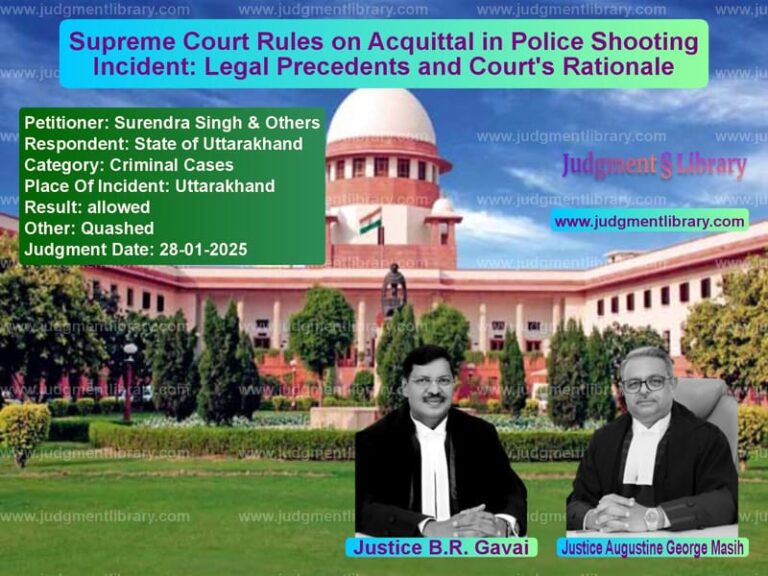Supreme Court Upholds Caste Certificate of Lingayat-Ganiga Candidate in Karnataka Reservation Dispute
The Supreme Court of India, in the case of M.V. Chandrakanth vs. Sangappa & Ors., upheld the Karnataka High Court’s ruling affirming the caste certificate of a Lingayat-Ganiga candidate for reservation under Category II-A. The Court dismissed the appeal challenging the validity of the caste certificate and found no reason to interfere with the High Court’s well-reasoned judgment.
Background of the Case
The case revolved around a dispute regarding caste-based reservation in Karnataka for government job recruitments. The appellant, M.V. Chandrakanth, and the respondent, Sangappa, both applied for government positions under Category II-A, which provides 15% reservation for certain backward classes. While the appellant belonged to the Kuruba caste, the respondent claimed reservation under the Ganiga sub-caste.
The appellant challenged the respondent’s caste certificate, arguing that the respondent actually belonged to the Lingayat community, which falls under Category III-B with only 5% reservation. The Karnataka Public Service Commission (KPSC) selected both candidates under Category II-A, but the appellant contested the respondent’s selection, alleging misrepresentation of caste status.
Key Legal Issues
- Was the respondent’s claim of belonging to the Ganiga caste valid under Karnataka’s reservation policy?
- Did the Karnataka High Court err in upholding the respondent’s caste certificate?
- Can a person belonging to the Lingayat-Ganiga sub-caste claim reservation under Category II-A?
- Was there any procedural lapse in the issuance and verification of the caste certificate?
Arguments Presented
Appellant’s (M.V. Chandrakanth) Arguments:
- The respondent belonged to the Lingayat caste and not the Ganiga caste listed under Category II-A.
- His father’s school records listed their caste as Hindu Lingayat, proving that they did not belong to the backward class category.
- The caste certificate issued to the respondent was obtained fraudulently and should be revoked.
- The Karnataka Backward Classes Commission had previously clarified the distinction between Lingayat-Ganiga and Hindu-Ganiga.
Respondent’s (Sangappa) Arguments:
- The caste certificate was legally issued based on historical records and verification processes.
- Lingayat-Ganigas are traditionally recognized as part of the backward class and qualify for Category II-A reservation.
- The appellant failed to provide conclusive evidence that the caste certificate was obtained fraudulently.
- There was no legal distinction between Hindu-Ganiga and Lingayat-Ganiga for reservation purposes.
Supreme Court’s Observations and Ruling
The Supreme Court upheld the Karnataka High Court’s decision, dismissing the appellant’s claims. The key findings included:
- The respondent’s caste certificate was issued based on government records, including a pre-constitution document from 1909 listing his great-grandfather as ‘Ganiger.’
- The Karnataka Backward Classes Commission’s earlier reports supported the inclusion of Lingayat-Ganigas under Category II-A.
- The appellant’s reliance on his father’s school records was insufficient to challenge the respondent’s claim.
- The Division Bench of the Karnataka High Court had correctly examined historical and legal interpretations of caste classifications in Karnataka.
The Supreme Court stated:
“The Division Bench was correct in its finding that Hindu-Ganiga and Lingayat-Ganiga are not distinct castes for reservation purposes. The classification of Lingayat-Ganiga under Category II-A was done as per established government policies.”
The Court found no procedural irregularities in the issuance of the caste certificate and rejected allegations of fraud. Consequently, the appeal was dismissed.
Key Takeaways from the Judgment
- The Karnataka government’s reservation policies do not distinguish between Hindu-Ganiga and Lingayat-Ganiga.
- Caste certificates issued after proper verification hold strong legal validity.
- Historical documents, including pre-constitution records, can be used as evidence for caste verification.
- Reservation disputes require substantial evidence to override official caste certificates.
Impact of the Judgment
- This ruling strengthens the legal position of Lingayat-Ganigas in Karnataka’s reservation framework.
- It reaffirms the importance of documentary evidence in caste-related disputes.
- The decision prevents unwarranted challenges to valid caste certificates.
- Government institutions will now have clearer guidelines on caste verification procedures.
Conclusion
The Supreme Court’s decision in this case clarifies that caste-based reservations in Karnataka are governed by established policies and historical classifications. By upholding the respondent’s caste certificate, the Court reinforced the validity of government records and prevented unjustified challenges to legitimate reservation claims. This ruling sets an important precedent for similar cases and ensures that reservation benefits reach eligible candidates as intended by law.
Petitioner Name: M.V. Chandrakanth.Respondent Name: Sangappa & Ors..Judgment By: Justice Indira Banerjee, Justice J.K. Maheshwari.Place Of Incident: Karnataka.Judgment Date: 29-07-2022.
Don’t miss out on the full details! Download the complete judgment in PDF format below and gain valuable insights instantly!
Download Judgment: m.v.-chandrakanth-vs-sangappa-&-ors.-supreme-court-of-india-judgment-dated-29-07-2022.pdf
Directly Download Judgment: Directly download this Judgment
See all petitions in Recruitment Policies
See all petitions in Public Sector Employees
See all petitions in Promotion Cases
See all petitions in Judgment by Indira Banerjee
See all petitions in Judgment by J.K. Maheshwari
See all petitions in dismissed
See all petitions in Quashed
See all petitions in supreme court of India judgments July 2022
See all petitions in 2022 judgments
See all posts in Service Matters Category
See all allowed petitions in Service Matters Category
See all Dismissed petitions in Service Matters Category
See all partially allowed petitions in Service Matters Category







